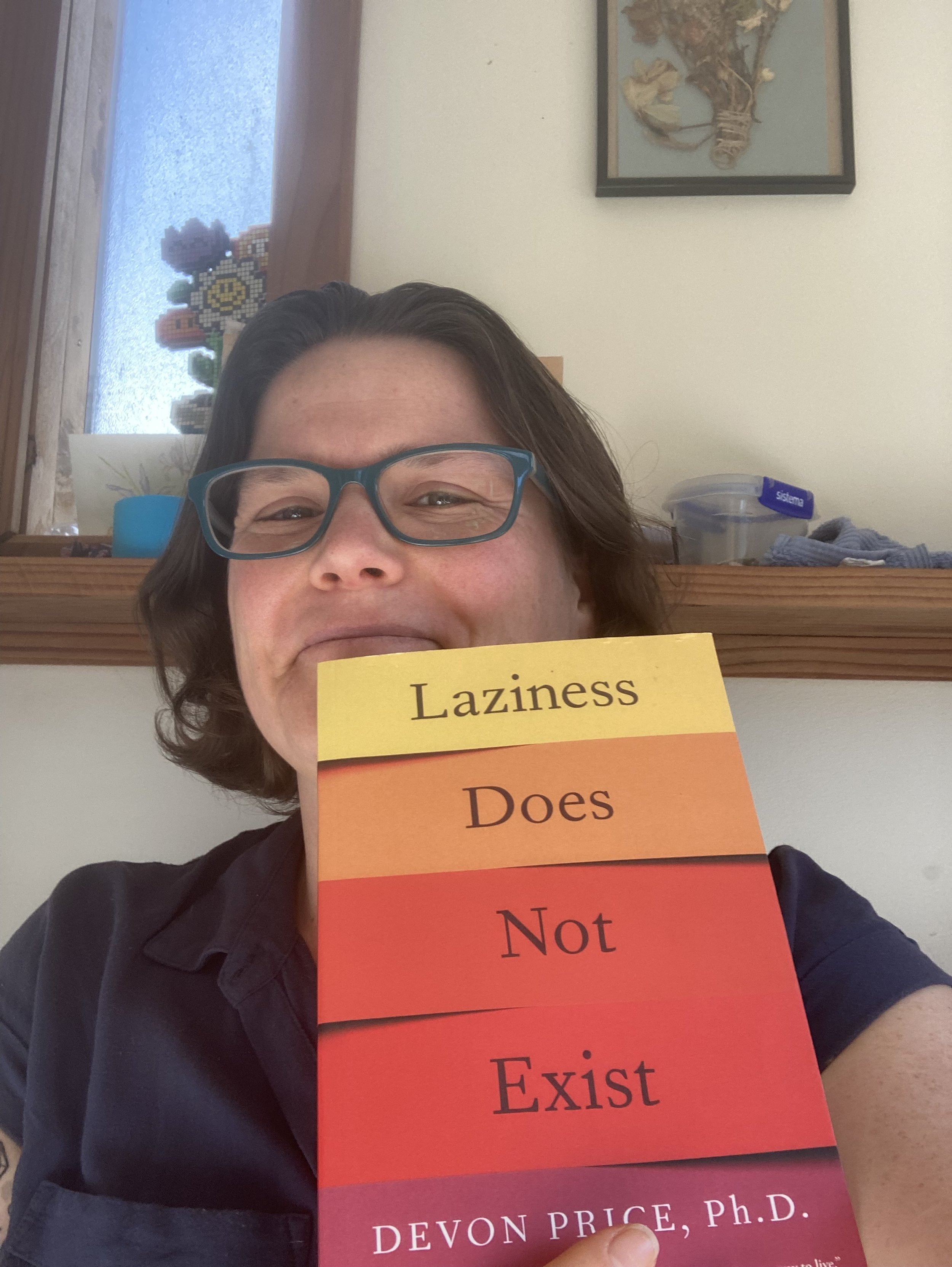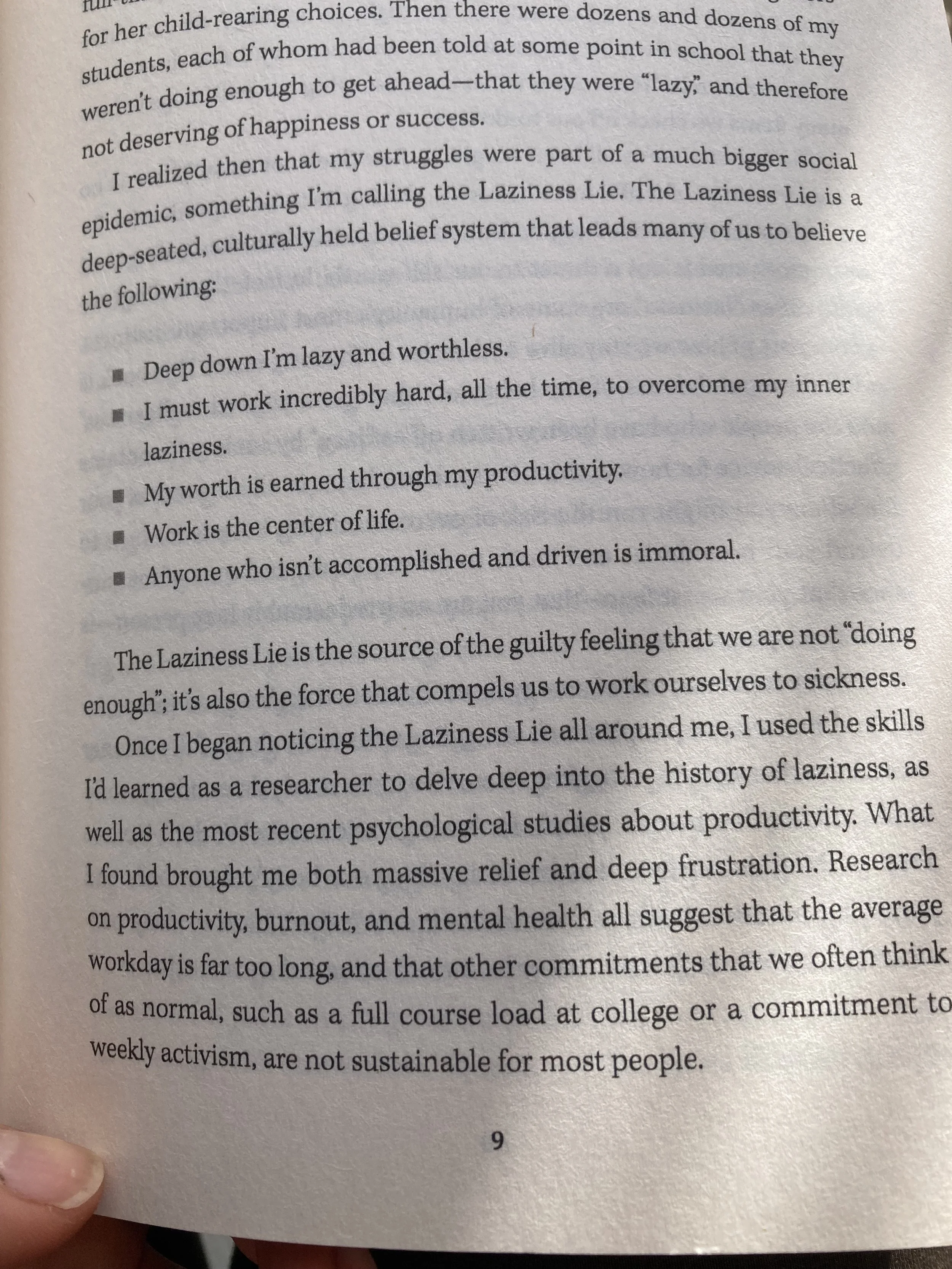Laziness Does Not Exist
Sometimes you read a book and it cements and affirms so many of the things you have been thinking. It feels so rewarding and legitimising. ‘Laziness Does Not Exist’ by Devon Price is one such book. I cannot recommend this book highly enough.
Link to their Medium writing here.
(On a side note their other book ‘Unmasking Autism’ gave me so many aha moments and was a key factor in seeking a diagnosis)
Image description: a photo of me a brown haired, fair skinned person wearing glasses smiling and holding up the book Laziness Does Not Exist.
This book it verbalises many of the things I talk about with clients and have learned in my own life in such a clear way. Devon Price provides a diverse range of lived experience examples along with research to unpack and discuss ‘The Laziness Lie’, what it is and how we can combat it. Here’s some notes I took while reading, along with some of my own thoughts. There is so much important wisdom in this book.
The 3 tenets of the laziness lie:
Your worth is your productivity
You cannot trust your own feelings and limits
There is always more you could be doing
Right from the beginning the points in this book hit home.
“The Laziness Lie is a deep-seated, culturally held belief system that leads many of us to believe the following:
Deep down I’m lazy and worthless.
I must work incredibly hard, all the time, to overcome my inner laziness.
My worth is earned through my productivity.
Work is the center of life.
Anyone who isn’t accomplished and driven is immoral.
The Laziness Lie is the source of the guilty feeling that we are not ‘doing enough’; it’s also the force that compels us to work ourselves into sickness.” (p. 9)
Image description: picture of page 9 of The Laziness Lie. Key text is typed above.
Does this sound familiar to you? Do you have any of these beliefs? It sure does to me and these are some old beliefs! I have been working on unlearning and letting go of so many things over the past 10+ years since developing chronic illness. That journey is ongoing as I continue to unpack my internalised ableism and beliefs around productivity and worth. This next quote really hit home for me. It’s something I talk about with clients often and something I’m still learning and practicing for myself.
“When we feel unfocused, tired, and lazy, it's often because we desperately need some time to rest our bodies and brains. Research has repeatedly shown that a person on the verge of burnout will have trouble staying focused and productive: No amount of pressure and stress can magically help a person overcome that lack of focus and motivation. The solution is to cut way back on expectations for a while. Overextended people have to find space in their lives to sleep, power down their stressed-out minds. and recharge their mental and emotional batteries. You can wait until you reach a breaking point like Max and I did, or you can prevent illness and burnout by being gentle with yourself before it's too late.” (p. 36)
When we are feeling tired, overwhelmed, burnt out etc. we need to do less, not more. If we’re feeling unfocused it’s better to step away, take a break, move, get outside, do something else, rest, and then come back to it, instead of trying to force our way through the fog.
This was another concept that really resonated: Laziness isn’t evil, it’s a warning; laziness helps us be creative, problem solve, reminds us of what matters.
“When we give our lives space for slowness, relaxation, and doing ‘nothing’, we can begin to heal some of our greatest wounds and to create lives for ourselves that are nourishing rather than exhausting.” (p. 64)
“Embracing laziness can have a revolutionary impact on our quality of life. When we stop measuring our worth by how many items we check off of a to-do list, we can finally begin to seek out the activities that truly matter to us. When we set priorities based on our real feelings rather than society's "shoulds" we feel a greater sense of authenticity. And when we savor our free time and work to move at a slower, lazier, more intuitive pace, we begin to repair the damage that years of overwork has done.” (p. 71)
Devon Price also talks about the importance of savouring the moment, making time for awe with novelty and wonder and this really resonated for me as an occupational therapist and neurodivergent person. Meaning is such a key factor in my life choices and wellbeing and the concept of awe, seeking out novelty and wonder. It felt so joyous to see this written down in such concrete terms. Now I know that savouring the moment can be difficult for many people, and the word mindfulness or meditation can have negative associations. But if we can step back and think about it as noticing what’s happening in the here and now, and if we are seeking out things that are meaningful, novel, bring us a sense of awe etc. we can create more pleasant moments so that we want to savour them. They also list mental habits that help us amplify or dampen feelings of joy and happiness.
Mental habits that help us appreciate and amplify feelings of joy:
Behavioural displays (showing happiness in our behaviour)
Being present (present moment, mindfulness)
Capitalising (communicating about a positive experience, sharing, celebrating)
Positive mental time travel (positive memories, planning and anticipating desired events)
Mental habits that dampen happiness:
Suppression
Distraction (I’m going to add a caveat here, that sometimes we need distraction to cope, it’s not always a bad thing)
Fault finding
Negative mental time travel
There were also some important points about creating boundaries around helping behaviours, questions to ask yourself if you have a tendency to emotional overcommitment to reflect on whether being involved is your responsibility.
Questions to Ask Before Trying to “Save” Someone (p. 178)
Can they solve this on their own?
Do they want help?
Do they want my help?
Am I the right person to provide help right now?
Can I direct them to seek help from a professional or a close loved one?
What are my motives for helping?
What will helping cost me?
We can support people without taking over and without giving too much of ourselves as well.
Devon Price also talks about ways to counter and keep the laziness lie at bay (I always love when there’s some good practical stuff in a book like this).
“Fighting the Laziness Lie, after all , isn’t about abandoning all goals. It’s about connecting with goals that truly light a fire inside us - and pursuing them in a healthy way. “ (p. 196)
In the final chapter were some key points for Keeping the Laziness Lie at bay:
Practice compassionate curiosity (self and others)
Look at the broader context (think about what else is going on)
Stop associating productivity with goodness
Be gentle with yourself
These seem like some pretty good tenets to live by and I’m going to keep practicing and unlearning.
And not get stressed by my bedside to read pile. I’m going to gentle with myself and read these when it feels doable for me and not on some externally or internally imposed schedule of how much I ‘should’ be reading.
Image description: a photo of 15 books in a shelf. They are mostly related to Autism and/or ADHD.
If you want to explore what nourishes you or look at alternatives for breathwork practices, there are some resources in my shop you might like to check out.



